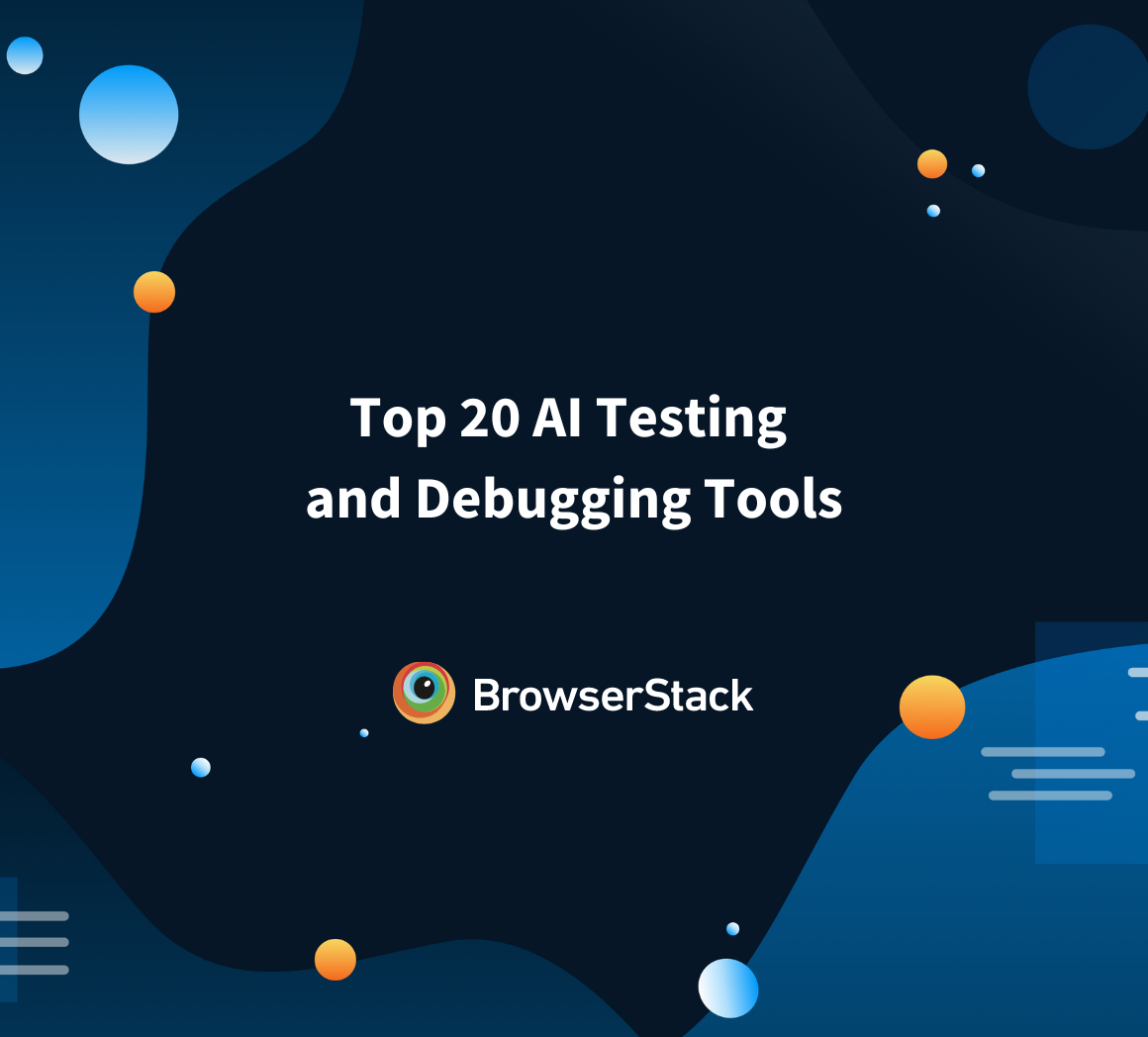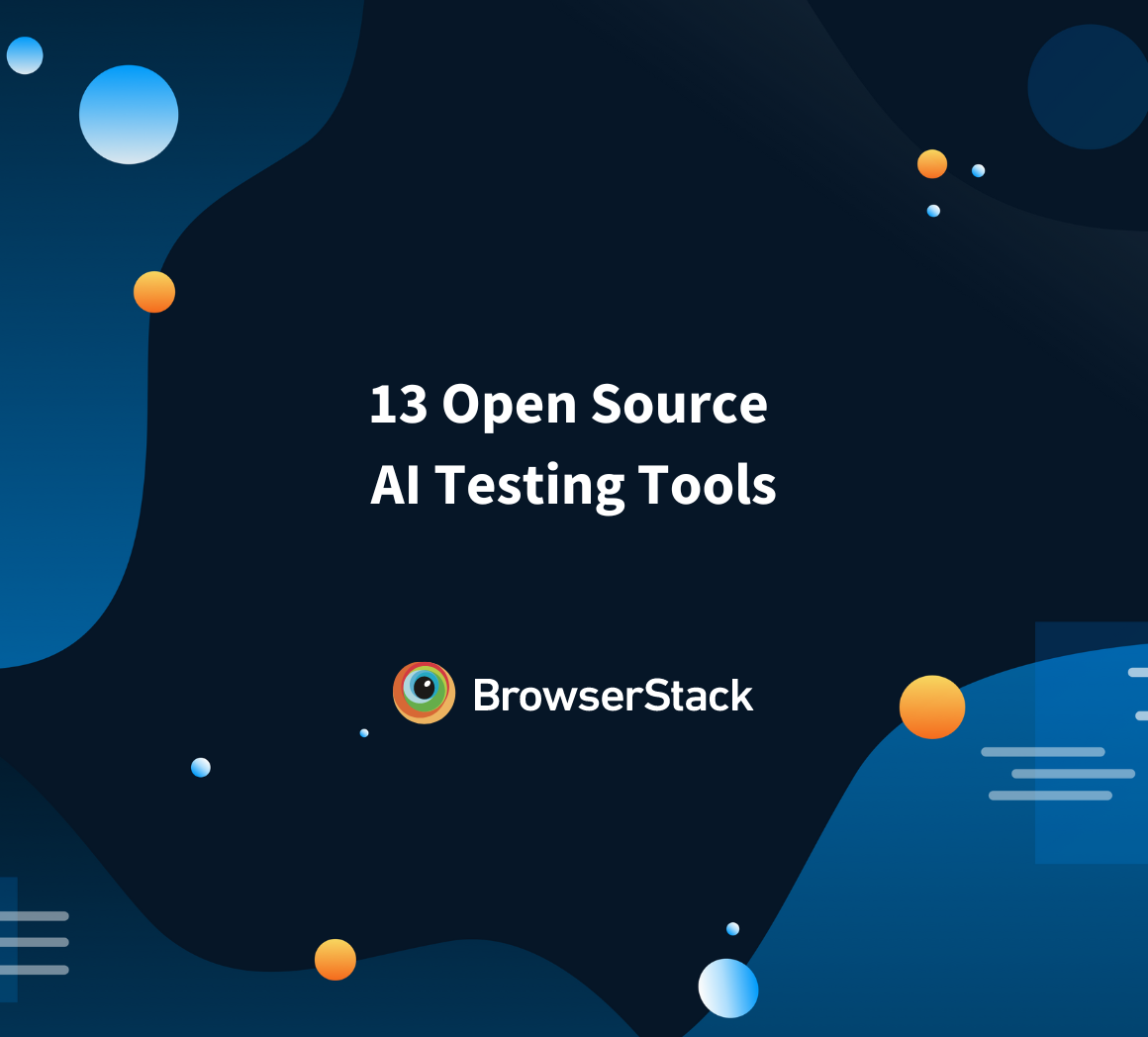AI-powered test case management tools help teams optimize test planning, execution, and reporting while reducing manual effort. As software development becomes more agile, it can sometimes be more efficient to use intelligent test management systems for testing.
Overview
What are AI Test Case Management Tools
AI Test Case Management Tools are platforms or tools that use artificial intelligence and machine learning to streamline, optimize, and automate test case creation, execution, maintenance, and reporting.
10 Best AI Test Case Management Tools in 2025
- BrowserStack Test Management
- Aqua Cloud
- TestRigor
- Practitest
- iHarmony
- Eggplant
- Parasoft
- TestCraft
- Zebrunner
- ACCELQ
In this article, learn the benefits of AI Test case management tools, explore the best AI Test case management tools, compare them, and look at how to choose the right test case management tool.
What are AI Test Case Management Tools
AI Test Case Management Tools are platforms or tools that use artificial intelligence and machine learning to streamline, optimize, and automate test case creation, execution, maintenance, and reporting. These tools analyze historical test data, predict defects, optimize test coverage, and generate intelligent reports. By integrating AI, these tools let teams reduce human errors, speed up testing, and improve overall software quality.
Benefits of AI Test Case Management Tools
Using AI tools to manage test cases enhances results, reducing time spent to manually handle tests especially when dealing with complex systems. The following are some benefits of using AI test case management tools:
- Automated tools can convert natural languages into test cases
- Manual efforts are reduced
- Test convergence is improved
- Fast and improved test case generation
- Improved analytics and real-time reporting
- Offers Test case suggestion
Read More: Top 20 AI Testing and Debugging Tools
10 Best AI Test Case Management Tools in 2025
Here are the top AI test case management tools in the market that effectively channelize AI to enhance test case management:
1. BrowserStack Test Management
Teams using BrowserStack Test Management can create, manage, and track manual and automated test cases end-to-end with integrated workflows and dashboards. It helps you find the root causes of test failures and provides you with actionable insights to improve the overall health of your testing from a stability and performance point of view.
Key Features:
- AI-Powered Test Authoring: Builds test cases using Jira stories and past test data effectively.
- Test Case Management: Connects automated test executions to corresponding test cases seamlessly and integrates with CI/CD tools to automatically trigger test runs. It even facilitates requirement-led test case creation.
- CI/CD Integration: Integrates with Jenkins, CircleCI, and other CI/CD tools to trigger automated test runs.
- Dashboard analytics: Track and monitor automation coverage, pass/fail rates, and defect trends.
- Test Case Import: Import test cases seamlessly from CSV files.
Integrations
- CI/CD: Azure Pipelines, Jenkins
- Project Management: Jira, Azure
- Automation: Mocha, Cypress, WebdriverIO, PyTest, TestNG
Why Choose BrowserStack Test Case Management Tool?
BrowserStack Test Case Management tool provides teams with full-stack test case management capabilities. It offers AI-powered test authoring and intelligent suggestions based on existing tests and Jira stories, streamlining the test creation process and ensuring consistency across test cases.
- Robust AI-Powered Test Authoring & Execution: Generates test case suggestions based on existing tests and Jira stories and auto-populates test case fields with intelligent recommendations. It also spots relevant test cases to execute by analyzing Jira stories and past test runs.
- Automation-First Test Management: Provides real-time reporting that integrates effortlessly with automation frameworks, links automated test executions to associated test cases seamlessly, and integrates with CI/CD tools to automatically trigger test runs.
- Efficient Test Case Management: Facilitates bulk editing, searching, and filtering of test cases and facilitates organizing test cases into folders with drag-and-drop functionality.
- Seamless Integration with Issue Trackers: Offers two-way sync with Jira (both cloud and on-premise) and integrates with tools like Azure DevOps and Asana.
- Freemium Plan: The tool comes with a free plan with robust features that can be accessed by 10 users.
Customer Review
BrowserStack has a loyal customer base, and the reviews prove the same.
2. Aqua Cloud
Aqua Cloud is an AI-powered test management tool that helps teams speed up test creation and management.
Key Features
- Facilitate seamless regression testing.
- Fast and easy connection of various ready-for-use automation agents.
- See test results, information, and execution status directly in Jira.
- Describe your test cases in detail with rich text, images, attached files, and more.
- Integrate test cases directly into your Jira, where they are automatically linked with Jira elements.
Pros
- Integrates seamlessly with Jira and Jenkins
- Flexible reporting capability
- Free basic license for customers
- It is easy and straightforward to setup
- It supports team collaboration
Cons
- Steep learning curve
- Basic UI
- Limited onboarding resources
- Aqua ALM offers less customization compared to some competitors, which might not suit all project needs.
Ideal for: Mid-sized and enterprise-level QA teams
3. TestRigor
Teams using TestRigor can use free-flowing plain English to build test automation. TestRigor operates by translating high-level instructions into a more specific manageable set of steps.
Key Features
- TestRigor facilitates Email, Phone calls, and SMS validation.
- It allows you to post test results to any test case management system, Slack, MS Teams, Emails, etc.
- Supports native desktop testing
- Allows to easily generate unique test data based on specified format or Regex
Pros
- Cross-platform applications can be tested
- Full retest can happen in under fifteen minutes
Cons
- TestRigor focuses more on automation than test documentation.
- System instability, leading to test case failures
Ideal for: Large enterprises
4. Practitest
Practitest is a comprehensive test management platform designed to centralize and optimize QA operations. Practitest aims to streamline workflows, improve team collaboration, and provide insights into testing processes.
Key Features
- It unifies testing practices, tools, teams, and tasks on a single platform, offering end-to-end coverage of the QA process.
- Integrates with various bug tracking tools (JIRA, Pivotal Tracker, Bugzilla) and automation/CI tools (Selenium, Jenkins, TeamCity)
- Uses ValueScore for process optimization and test prioritization
- Provides a customizable dashboard.
Pros
- Seamless integration with tools such as ClickUp, Jira, and Azure DevOps
- Comprehensive reports
Cons
- Many features are only available in higher-tier pricing plans or as add-ons, which may be a drawback for teams looking for a comprehensive solution within a certain budget.
- Exploratory tests are treated similarly to scripted tests, which may not be ideal for teams that heavily rely on exploratory testing.
Ideal for: Both small and large enterprise teams
5. iHarmony
iHarmony is an AI-powered, open-source testing tool designed to streamline automated testing across mobile and web applications. It uses machine learning algorithms to intelligently generate and optimize test cases. Its self-learning capabilities enable it to improve test coverage over time, making it a forward-thinking choice for teams that prioritize automation scalability.
Key Features
- Self-learning capabilities
- Uses machine learning to automatically create test cases based on code patterns and past test results.
- It allows testers to create test automation scripts using simple record & playback and drag & drop low-code, no-code test script creation capabilities.
- It reduces test cycle times exponentially with parallel execution on multiple geo-locations combinations.
- Supports cross-platform applications
Pros
- It provides support for both web and mobile applications
- Continuously learns from previous test cases, improving future test runs.
- It allows users to schedule tests for execution at specific times or on a recurring basis
Cons
- Since it is relatively new, it has a smaller community compared to older frameworks.
- Depending on the complexity of test cases, iHarmony may be slower in execution.
- AI-driven features sometimes have a steeper learning curve.
Ideal for: Teams that want to harness machine learning to streamline their testing processes.
6. Eggplant
This test automation tool allows users to automate tests from the user’s perspective, independent of operating systems and without needing access to the application’s source code. It uses a model-based approach, creating a digital twin of the application under test to generate and execute tests.
Key Features
- Intelligent computer vision
- AI-powered exploratory testing for gaining actionable insights
- Cross-platform compatible
- Provides integration capabilities with CI/CD tools such as GitHub, Jenkins, and Bamboo
- AI-driven test modeling lets users test any application across any browser, OS, and device. This is achieved by creating a digital twin model of an application, users can perform comprehensive testing of complex systems, workflows, and user journeys across various platforms.
Pros
- Provide full test coverage across any device, platform, or operating system, and any layer of the UI
- Reduces maintenance costs with scriptless testing modeling
Cons
- Steep learning curve for model-based testing functionalities that require training and time to master.
- The scripting language (SenseTalk) is specific to Eggplant, which might be a limitation for teams looking for more widely used languages.
Ideal for: Teams with cross-platform testing needs.
Read More: How to test GitHub Actions locally?
7. Parasoft
Parasoft is a robust, commercial-grade tool offering a suite of testing solutions for automated functional testing, API testing, and service virtualization. It uses AI-powered analytics to help automate complex testing tasks and ensure faster, more reliable software releases.
Key Features
- Leverage AI-Powered Test Generation to create and maintain test cases to reduce the manual effort required for test creation.
- Parasoft SOAtest handles a vast range of protocols, making it adaptable to almost any testing scenario you might encounter.
- Enables simulation of unavailable services, allowing testing to proceed without complete system dependencies.
- Supports automated testing across various types, including functional, regression, and load testing.
Pros
- Provides strong support for both REST and SOAP API testing, making it an all-in-one solution for service-level testing.
- Provides deeply insightful reports and dashboards to track test results, code coverage, and overall quality metrics.
Cons
- Has a steep learning curve due to its extensive feature set.
- While powerful, integrating with some third-party tools or older systems may require additional effort or support.
- Limited Community Support
Ideal for: Organizations building complex systems, though the high cost and learning curve might limit its appeal for smaller teams.
8. TestCraft
TestCraft leverages AI to generate automated tests for the main Automation frameworks and programming languages. It is a free open source browser extension for software testing.
Key Features:
- Uses AI-powered assistants to simplify your testing process and boost product quality.
- Automatically generate test scripts in multiple languages and frameworks, including JavaScript, TypeScript, Java, C#, and Python, and using testing frameworks like Playwright, Cypress, and Selenium.
- Utilizes LLMs to brainstorm diverse testing ideas and scenarios.
- Assess the accessibility of UI components to ensure compliance with standards and improve usability.
Pros
- Reduced maintenance and faster test creation can lead to overall cost savings.
- The visual interface makes test automation accessible to manual testers and those without strong coding skills.
Cons
- Limited Community Support
- Relying heavily on a specific codeless platform can lead to vendor lock-in.
Ideal for: Small to mid-sized organizations
9. Zebrunner
Zebrunner is an AI-powered suite of testing solutions built to accelerate delivery without compromising quality. With customizable dashboards, seamless integrations, and an intuitive UI, it enables you to scale testing and achieve exceptional product outcomes.
Key Features
- Automate failure analysis with its AI/ML Failure Reason classification feature
- Test applications on real devices
- Leverage cross-browser testing
- Live dashboard with extended metrics
Pros
- Supports multiple frameworks
- Offers rich, insightful reports with visual logs, screenshots, video recordings, and stack traces.
Cons
- Has a learning curve since understanding and configuring the integrations with various tools might require some initial effort.
Ideal for: Teams looking for an all-in one test management tool on a budget.
10. ACCELQ
AccelQ is a cloud-based test automation platform designed with a low-code approach, allowing users to automate tests without needing to write complex code. Its intuitive, codeless interface makes it accessible to testers of all skill levels, enabling quick test creation and execution.
Key Features:
- Uses AI to create optimized test cases, improving efficiency and coverage.
- Enables test automation without writing code, making it accessible to non-technical users.
- Integrates easily with tools like Jenkins and Azure DevOps, supporting continuous testing.
Pros
- The codeless platform is intuitive, allowing quick onboarding for teams with limited coding expertise.
- Offers automation for web, desktop, and API applications, making it highly versatile.
Cons
- Can be relatively expensive for small teams or projects.
- Limited Flexibility for Advanced Users. The codeless nature, while easy to use, may limit flexibility for users who need more control over test scripts.
Ideal for: Teams looking to accelerate their continuous testing processes without requiring deep coding knowledge.
Read More: What is AI Model Testing?
How to Choose the Right AI Test Case Management Tool?
Choosing the right AI-powered test case management tool is an important decision that can significantly impact software testing efficiency, coverage, and overall quality.
Here are some factors and functionalities to look for when choosing the right AI Test case management tool:
- Automation Capabilities: Look for tools that assess automation coverage across UI, API, and performance testing, as these can greatly benefit the software development lifecycle.
- Compatibility: Select a tool that integrates smoothly with your existing CI/CD pipeline, languages, and frameworks.
- Security: Check that the tool complies with your security standards, especially for projects involving sensitive data.
- Features: Assess the tool’s features like automated test generation, bug detection, visual testing, and predictive analytics to match your project requirements.
- Scalability: Opt for a tool that can handle the increasing complexity and volume of your tests as your project expands.
- Support: Choose a tool backed by reliable customer support and an active community for troubleshooting and advice.
How does AI enhance Test Case Management?
AI is increasingly being integrated into test case management tools and processes to enhance efficiency, accuracy, and overall effectiveness. By leveraging machine learning, natural language processing (NLP), and other AI techniques, these tools can automate various tasks, provide intelligent insights, and ultimately improve the quality of software testing. Instead of replacing testers, AI aims to augment their capabilities, allowing them to focus more on complex and strategic business activities.
Here are some ways AI enhances Test case management:
- Helps Prioritize Testing Efforts: AI algorithms help prioritize tests based on potential risks. This could improve how teams manage their testing efforts.
- Enhances Visual Testing: AI-powered visual testing tools quickly spot differences in user interfaces, reducing the need for manual checks.
- Analyze Test Results: AI tools analyze test results in real time, assisting teams in identifying and fixing issues more efficiently and quickly.
- Seamless Generation of Test Cases:Using Natural Language Processing, AI tools understand requirements, generate test cases from user stories, and establish collaboration between technical and non-technical teams.
- Reduce Maintenance Efforts: AI tools automatically update and adjust test scripts to changes in the application, minimizing maintenance efforts and ensuring continuous integration.
Read More: Top 14 AI Testing Tools
AI Trends In Test Management
AI is transforming various aspects of the software development lifecycle, and testing is no exception. AI’s ability to analyze large amounts of data, identify patterns, and automate complex tasks is leading to significant advancements in how testing is planned, executed, and analyzed.
Here are some AI trends in Test management:
- Intelligent Test Prioritization: AI analyzes historical test data, defect patterns, code changes, and risk assessments to prioritize test cases based on their likelihood of failure and impact .This allows testing teams to focus on the most critical areas, optimizing test execution time and resource allocation.
- Smart Test Data Generation and Management: AI is being used to generate realistic and varied test data, including edge cases and boundary values. This helps minimze the time and effort spent on manual data creation.
- Intelligent Test Failure Analysis and Root Cause Identification: AI algorithms analyze test logs, error messages, and failure patterns to automatically group similar failures and suggest potential root causes, significantly accelerating debugging efforts.
- Self-Healing Test Automation: AI integrated with test automation frameworks enables tests to automatically adapt to minor UI or application changes, reducing the need for manual test script maintenance and improving test stability.
- Integration of AI with DevOps and Continuous Testing: AI is facilitating the integration of more intelligent and adaptive testing into CI/CD pipelines. This facilitates faster feedback and continuous quality assurance throughout the development lifecycle.
Read More: How to build an effective CI CD pipeline
Conclusion
AI test case management tools have transformed software testing from reactive to proactive approach. With intelligent automation, faster test development, and risk-driven execution, teams in 2025 can achieve higher quality releases at velocity.
With tools like Browserstack Test Management you can create, manage and track manual and automated test cases with its integrated end-to-end workflows and dashboards. By maintaining a centralized repository for all your manual and automated test cases, you get better visibility and control over the testing process.






